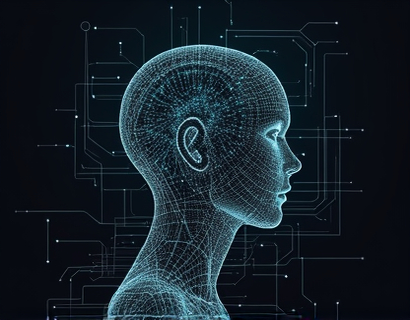Personalized AI Companions: Enhancing Children's Creativity and Emotional Health Through Interactive Digital Friends
In the digital age, technology has become an integral part of children's lives, offering numerous opportunities for learning, entertainment, and personal growth. One innovative approach that has gained attention is the development of personalized AI companions designed to boost children's creativity and emotional well-being. These AI-driven imaginary friends provide a unique blend of interactive companionship and educational value, fostering imaginative play and social skills in a safe digital environment.
The concept of AI companions for children is rooted in the understanding that interactive and personalized interactions can significantly impact a child's cognitive and emotional development. Unlike traditional toys or digital entertainment, AI companions can adapt to a child's individual needs, interests, and emotional state, offering a tailored experience that promotes both creativity and emotional health.
Fostering Imaginative Play
Imaginative play is a crucial aspect of childhood development, allowing children to explore their creativity, solve problems, and develop social skills. AI companions serve as dynamic playmates that can engage children in a variety of imaginative scenarios. These digital friends can transform a simple room into an endless world of adventure, encouraging children to think outside the box and use their imagination to create stories and scenarios.
For instance, an AI companion might suggest building a castle in the air, where the child can be the king or queen, or embark on a journey to a distant planet, encountering alien species and solving puzzles along the way. The AI's ability to adapt to the child's ideas and suggestions ensures that the play remains engaging and stimulating, fostering a deeper sense of creativity and imagination.
Supporting Social Skills Development
Social skills are essential for a child's success in both personal and professional life. AI companions can play a significant role in developing these skills by providing a safe and supportive environment for children to practice communication, empathy, and cooperation. Through interactive dialogues and role-playing scenarios, children can learn how to express themselves effectively, understand others' perspectives, and navigate complex social situations.
For example, an AI companion might engage a child in a conversation about feelings, asking how they would react in a given situation and providing feedback on their responses. This interactive approach helps children develop emotional intelligence and social competence, preparing them for real-world interactions.
Creating a Safe Digital Environment
One of the primary concerns for parents and guardians is the safety of their children's online experiences. AI companions offer a solution by creating a controlled and secure digital space where children can explore and learn without exposure to inappropriate content or online risks. The AI system continuously monitors and adjusts the interaction based on the child's age, interests, and emotional state, ensuring a positive and safe experience.
Moreover, these AI companions can be designed to promote healthy screen time habits by setting limits, encouraging breaks, and integrating physical activities into the play experience. This balanced approach helps children develop a healthy relationship with technology from an early age.
Personalization and Adaptability
The true power of AI companions lies in their ability to personalize the experience for each child. By analyzing a child's preferences, behaviors, and emotional responses, the AI can tailor interactions to suit their unique needs. This personalization ensures that the companion remains engaging and relevant, fostering a strong bond between the child and the digital friend.
For instance, if a child shows a particular interest in art, the AI companion can incorporate artistic activities into their interactions, such as creating digital paintings or designing stories with illustrations. This personalized approach not only enhances the child's creativity but also reinforces their interests and passions.
Promoting Emotional Well-Being
Emotional health is as important as cognitive development, and AI companions can play a vital role in supporting a child's emotional well-being. These digital friends can provide a listening ear, offering comfort and reassurance during challenging times. By recognizing and responding to a child's emotions, AI companions help children learn to manage their feelings and develop resilience.
For example, if a child is feeling sad or anxious, the AI companion might suggest calming activities, such as deep breathing exercises or guided meditation. It can also offer words of encouragement and positive affirmations, helping to boost the child's self-esteem and confidence.
Enhancing Parent-Child Interaction
AI companions can also serve as a bridge between children and their parents, enhancing the quality of parent-child interactions. By providing insights into a child's interests, emotional state, and play patterns, these AI systems can help parents better understand and support their child's development. This additional layer of understanding can lead to more meaningful and effective parenting strategies.
Moreover, AI companions can facilitate joint activities between parents and children, such as creating stories or solving puzzles together. These shared experiences not only strengthen the parent-child bond but also model healthy technology use and collaborative problem-solving.
Educational Value
Beyond creativity and emotional health, AI companions can also offer educational benefits. By integrating learning activities into their interactions, these digital friends can help children acquire new knowledge and skills in a fun and engaging way. For example, an AI companion might turn a history lesson into an interactive adventure, where the child explores ancient civilizations and uncovers historical facts.
This approach to learning makes education more accessible and enjoyable, catering to different learning styles and paces. Children can learn at their own speed, receiving immediate feedback and encouragement, which can boost their confidence and motivation.
Challenges and Considerations
While the benefits of AI companions are numerous, it is essential to address potential challenges and considerations. One key concern is the digital divide, ensuring that all children, regardless of their socioeconomic background, have access to these innovative tools. Efforts should be made to make AI companions affordable and available to a wide range of families.
Another consideration is the need for ongoing research and development to ensure that AI companions are effective and beneficial. This includes studying the long-term impacts on children's development and making adjustments based on empirical evidence. Transparency and ethical guidelines should guide the creation and deployment of these AI systems to protect children's privacy and well-being.
Conclusion
Personalized AI companions represent a promising frontier in children's technology, offering a unique blend of creativity, emotional support, and educational value. By providing interactive and adaptive companionship, these digital friends can enhance a child's imaginative play, social skills, and emotional health in a safe and controlled environment. As technology continues to evolve, the potential for AI companions to positively impact children's lives is vast, making them a valuable tool for parents, educators, and caregivers.











































